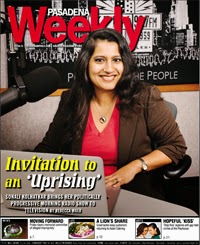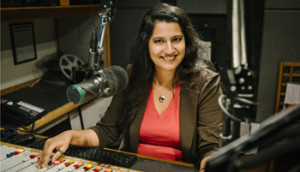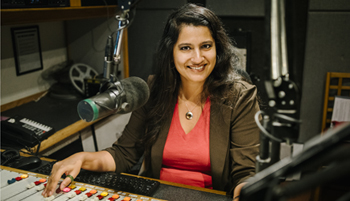 Sonali Kolhatkar brings her politically progressive morning radio show to television
Sonali Kolhatkar brings her politically progressive morning radio show to television
By Rebecca Waer 10/30/2014
There’s an uprising of a new kind occurring in Pasadena this fall.
Thanks to a massive fundraising effort through the crowdfunding site Indiegogo, KPFK’s popular talk radio program “Uprising” now airs on both radio and television.
Their goal was to raise $60,000 in just 30 days. Not only did they meet the goal, they exceeded it for a total of just a few dollars shy of $62,500.
“Uprising” host Sonali Kolhatkar says the fundraising wasn’t easy — she and her producer, Bipasha Shom, asked every family member, friend, former colleague and neighbor they could think of to help raise the money.
Kolhatkar knows fundraising in the future won’t get any easier, either, but she knows they can do it.
“The public media industry is in a funding crisis right now. It’s unheard of that two people with such a small team could raise this much money, and in such a short period of time,” Kolhatkar says.
Although it may seem like a lot, Kolhatkar says money goes quickly in the world of television. “Some laugh hysterically at how small our budget is,” she says. “In the commercial world, that amount wouldn’t be enough to hire one full-time person to hold a camera. But in public radio, it’s a lot of money — we really stretch our dollars to the limit.”
Money raised will fund the show’s start-up expenses and operations, including salaries for two sound engineers and TV equipment, such as cameras, lights, and a state-of-the-art audio mixer, which will allow the show to do live-to-tape recording. Half the funds will pay one person who is very experienced with the studio equipment to help Kolhatkar and her small team put the whole show together.
For Kolhatkar, who is of Indian parentage and was born and raised in the United Arab Emirates in Dubai, the expansion of “Uprising” from radio into an additional television broadcast is very exciting, and more than she could have dreamed of early in her radio career.
‘Bleeding Afghanistan’
 Possessing degrees in physics, astronomy and astrophysics, Kolhatkar’s journalism career took a less than conventional trajectory. While working at Caltech’s Spitzer Science Center in the early 1990s, she learned about the plight of Afghan women and their struggle against the Taliban. Wanting to more actively make a difference in the world, Kolhatkar quit her lucrative career at Caltech and founded the nonprofit Afghan Women’s Mission (AWM), providing support to Afghan women. Her involvement as AWM’s director led to writing, as well as multiple national speaking engagements and media interviews. A friend suggested that Kolhatkar get a job at Pacifica Radio station KPFK, 90.7 FM. Kolhatkar auditioned for a host position at the station in 2002, and now, years later, hosts the station’s popular drive-time morning talk show “Uprising,” which she created in July 2003.
Possessing degrees in physics, astronomy and astrophysics, Kolhatkar’s journalism career took a less than conventional trajectory. While working at Caltech’s Spitzer Science Center in the early 1990s, she learned about the plight of Afghan women and their struggle against the Taliban. Wanting to more actively make a difference in the world, Kolhatkar quit her lucrative career at Caltech and founded the nonprofit Afghan Women’s Mission (AWM), providing support to Afghan women. Her involvement as AWM’s director led to writing, as well as multiple national speaking engagements and media interviews. A friend suggested that Kolhatkar get a job at Pacifica Radio station KPFK, 90.7 FM. Kolhatkar auditioned for a host position at the station in 2002, and now, years later, hosts the station’s popular drive-time morning talk show “Uprising,” which she created in July 2003.
In 2006, Kolhatkar, along with her husband James Ingalls, a Caltech astronomer, wrote “Bleeding Afghanistan: Washington, Warlords, and the Propaganda of Silence,” with a forward by fellow broadcaster David Barsamian, founder and director of Alternative Radio, a Boulder, Colorado-based syndicated weekly talk program.
In the book, available on Amazon.com, Kolhatkar and Ingalls draw from declassified government documents and interviews with Afghan activists, lawyers, students and refugees to paint a disturbing picture of the country under American occupation.
As described by Amazon, “‘Bleeding Afghanistan’ boldly critiques the exploitation of Afghan women to justify war by both conservatives and liberals, analyzes uncritical media coverage of US policies, and examines the ways in which the US benefits from being in Afghanistan.”
Need to See TV
Kolhatkar believes her experience with the hard sciences (and particularly cosmology, studying the origins of the universe) prepared her for a career in journalism by providing her with a deeper level of understanding about how things really work. She says her science background has served her well as a journalist.
“Science is about trying to understand how things work. That’s journalism, too — it’s uncovering why things are the way they are, learning about their origins. This approach has made me a better journalist.”
“Uprising,” Kolhatkar says, offers a different, more realistic take on news, and a perspective people are seeking but haven’t yet found in the white-male-dominated US news media.
“We [‘Uprising’] present ourselves differently. People need to see women of color, hear their perspective on topics. Then we are less likely to see one another as ‘others’ — as different from us,” she says. “This sets us apart from most other things you see on TV.”
Unfiltered Voice
A natural beauty, Kolhatkar says maintenance of her personal on-camera appearance is not in the show’s budget. The show, she says, has more important things to worry about than funding a hair and makeup person.
“I’m by no means physically perfect. I know the pressures women face when on TV. But if we want to reflect real people, we need to look like real people. My hope is that people will pay more attention to what I am saying, which is what they do with male on-camera journalists. And if they don’t, well, that’s their problem.”
Kolhatkar says she landed at KPFK for very a specific reason.
“For me, it was the only place on the radio dial that gave an unfiltered voice to the world — people who questioned what presidents and pundits say; people who understand that it’s important to hear ordinary voices. And KPFK does that,” she says. “I don’t think I would have walked in the door of anywhere else. Had there not been a KPFK, I wouldn’t be a journalist today.”
This is the first time a KPFK show has been turned into a TV broadcast. Only one other Pacifica program — “Democracy Now,” with Amy Goodman — started as a radio show and now televises its radio broadcast on television. Kolhatkar says it was upon this model that “Uprising’”s TV program was built.
Kolhatkar says she hopes the TV version of “Uprising” will serve as an example of what a news show can be.
“I really hope that somehow through this crazy attempt to broadcast a TV and radio show with such a tiny handful of people that we will make a dent in the media landscape. We bring lots of professors, investigators, researchers, but the kinds of questions we pose are usually rooted in the interest of ordinary Americans,” she says. “I hope people notice that and it’s validated. If we’re good enough, we’re hoping viewers respond.” n
“Uprising” can be seen on Free Speech TV via Direct TV, Roku, and Dish Network. DISH Network Channel 9415, DIRECTV Channel 348,Burlington Telecom 122 and 200 part-time cable affiliates. It can also be heard at 90.7 FM from 8 to 9 a.m. Monday through Friday.
Click here to read the original article.
